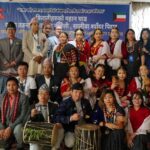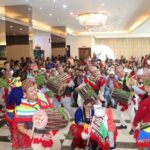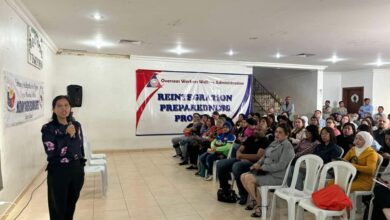Ubhouli festival lights up Kuwait with cultural splendor
The festival celebration not only honored tradition but also strengthened the bonds of community and culture among the Kirati diaspora.

-
The Ubhouli festival commenced with the singing of the national anthem and the ceremonial lighting of the lamp, symbolizing unity and harmony.
-
The celebration, which marks the planting season, holds deep cultural significance for the Kiratis, who observe Ubhauli on Baisakh Purnima and Udhauli on Mangsir Purnima.
By Raj Malla
Special to The Times Kuwait
The Rajdhani Hotel in Khaitan, Kuwait, was lively with celebrations as three Nepali Kirati organizations – Kirat Rai Ya Yokkha Kuwait, Kirat Yakthung Chumlung Kuwait, and Sunuwar Sewa Samaj Kuwait – joined hands to celebrate the Ubhouli festival with enthusiasm.
Under the theme of “Language, Culture Preservation: Kirati’s Common Campaign,” the event featured a vibrant array of traditional rituals and performances. From Sakela Ubhouli to Yakwa Tangnam, the festivities showcased the cultural richness of Nepal’s Kirati community.

A highlight of the evening was the enchanting musical performance by guest singer and musician Anil Koyi Rai, whose mastery of modern, oriental, and Sakela songs captivated the audience.
The celebration, which marks the planting season, holds deep cultural significance for the Kiratis, who observe Ubhauli on Baisakh Purnima and Udhauli on Mangsir Purnima.
Leading the event was Lila Bhakta Chemjong, President of Kirat Yakthung Chumlung Kuwait, with distinguished guests including Nepali Embassy Kuwait Ambassador Ghanshyam Lamsal, NRNA NCC Kuwait President Randhwaj Lama, and FNJ Kuwait President Raj Malla.
The program commenced with the singing of the national anthem and the ceremonial lighting of the lamp, symbolizing unity and harmony. Amit Kirati and Roshan Rai played pivotal roles in orchestrating the event, with Kirat Yakthung Chumlung Kuwait serving as the coordinator.
The Ubhouli festival celebration in Kuwait not only honored tradition but also strengthened the bonds of community and culture among the Kirati diaspora.















